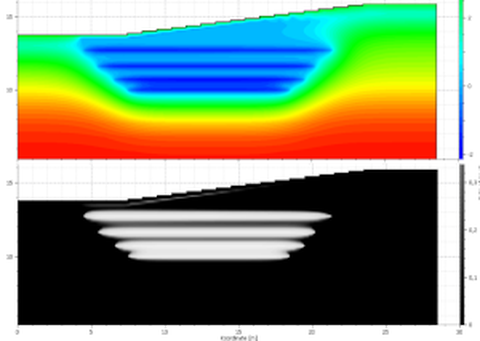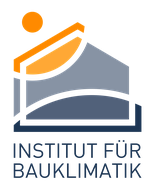Earth ice storage III
Table of contents
Basic data
| Status | ongoing |
|---|---|
| Funding source | Federal Ministry for Economic Affairs and Climate Action (abbreviated BMWK) |
| Funding reference number | 03EN3068F |
| Project term | 2023 - 2027 |
Summary

Projektbild Erdeis III
In Schleswig, a new type of ground ice storage system was implemented for the first time in the previous project "ErdEis II". The two earth ice storage facilities and two additional large-scale collector systems are used to supply heating and cooling to a construction area that is currently being built with approx. 60 residential units and a new fire station. During implementation, the geothermal sources, the energy center and the combined photovoltaic and solar thermal system on the roof of the fire station were equipped with measurement technology and a weather station was set up. These data, together with the operating data of the decentralized heat pumps in the buildings, are compiled in a database. With the help of scientific monitoring and benchmarking as part of the "IceStorage III" research project, the ground ice storage concept can be studied in detail and operating strategies derived. With the installed measurement sensors, it is possible to test, validate and, if necessary, adapt the simulation model set up in "IceStorage II" in order to establish a correct and manageable procedure and thus obtain the basis for a scientific understanding of the system. Heating and cooling periods, the switching on and off of individual components, as well as targeted rearrangements of heating and cooling quantities in different operating scenarios must be taken into account.
Parameter studies and optimization procedures can be used to identify and narrow down critical parameters so that transferability to future projects can be achieved. Furthermore, the modeling provides the basis for an overall system optimization considering the specifics of the cold local heating system.
In addition, it is a declared goal to further develop this source-optimized heating and cooling supply concept into an intelligent and sector-coupled electricity, heating and cooling supply concept. New business models that allow the residents' photovoltaic surpluses to be used directly on site, as well as the integration of external price and CO2 signals, will enable overarching overall system optimization. In this way, every producer and consumer in the district will be included in the supply and the various components of all energy sectors in the district will be coupled with each other as a "pulsating" system on the basis of the existing technology to form a district energy management system. Thus, flexibilities through, for example, the heat pumps and/or other controllable loads such as e-charging stations can be addressed through a reimagined approach of an Energy Management System can be used by the Schleswig municipal utilities to stabilize adjacent neighborhoods via the upstream grids. The flexible control and integration of heat grids into energy systems represents an increasingly relevant field of research for systemically integrating renewable generation at the local grid level and thus, for example, smoothing peaks before they arrive at the upstream grid level. The use of cross-sector synergies in particular offers great potential for a cost-efficient energy transition. Under the keyword "Redispatch 3.0", methodological principles for the system-serving overall optimization of the neighborhood under consideration with cold local heating, ground ice storage as a heat source and sink, heat pumps, photovoltaic generation, decentralized photovoltaic storage and e-mobility are to be developed and applied. Thus, the approach of Redispatch 2.0 will be further considered in the term "Redispatch 3.0" via the cross-sector control of smallest plants smaller than 100 kW electric within a plant swarm. In addition to the techno-economic issues, there is also a challenge in the inclusion or consideration of these flexibilization components in the benchmarking figures of the project.
Partners
- Schleswiger Stadtwerke GmbH
- Fachhochschule Westküste
- Consolinno Energy GmbH
- Energie PLUS Concept GmbH
- Friedrich-Alexander-Universität Erlangen-Nürnberg
Geozentrum Nordbayern
Project coordination
 © IBK
© IBK
Research assistant
NameDipl.-Ing. Hans Petzold
Send encrypted email via the SecureMail portal (for TUD external users only).
